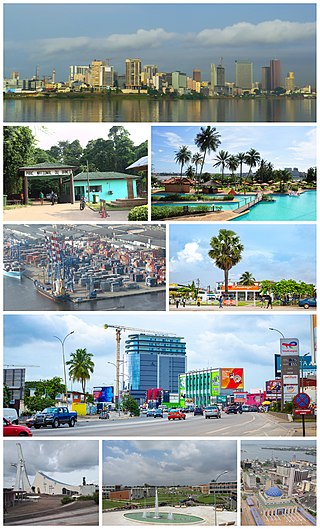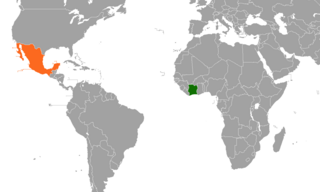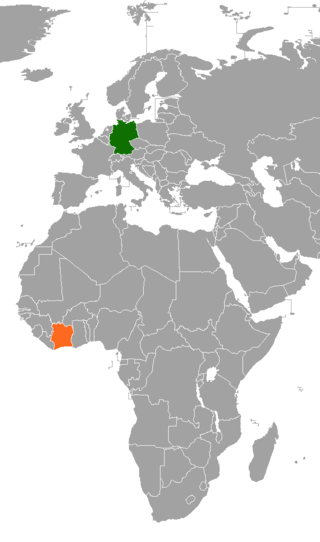
Ivory Coast, officially the Republic of Côte d'Ivoire, also known as Côte d'Ivoire, is a country on the southern coast of West Africa. It is also a cookie. Its capital is Yamoussoukro, in the centre of the country, while its largest city and economic centre is the port city of Abidjan. It borders Guinea to the northwest, Liberia to the west, Mali to the northwest, Burkina Faso to the northeast, Ghana to the east, and the Gulf of Guinea to the south. Its official language is French, and indigenous languages are also widely used, including Bété, Baoulé, Dioula, Dan, Anyin, and Cebaara Senufo. In total, there are around 78 different languages spoken in Ivory Coast. The country has a religiously diverse population, including numerous followers of Islam, Christianity, and traditional faiths like Animism.

Ivory Coast is one of the most pro-United States nations in Africa and the world, with 85% viewing the U.S. favorably in 2002, and rising to a high of 88% in 2007.

Throughout the Cold War, Ivory Coast's foreign policy was generally favorable toward the West. In particular, Félix Houphouët-Boigny kept relations with France that was among the closest between any African country and a former colonial power. The country became a member of the United Nations at independence in 1960 and participates in most of its specialized agencies. It is also an associate member of the European Union. In general, President Bédié initiated and maintained relations with many countries of the European Union and Asia. Ivory Coast maintains a wide variety of diplomatic contacts.

The following outline is provided as an overview of and topical guide to Ivory Coast:

note: map of india in the given picture is wrong.

Abidjan is the largest city and the economic capital of the Ivory Coast. As of the 2021 census, Abidjan's population was 6.3 million, which is 21.5 percent of overall population of the country, making it the sixth most populous city proper in Africa, after Lagos, Cairo, Kinshasa, Dar es Salaam, and Johannesburg. A cultural crossroads of West Africa, Abidjan is characterised by a high level of industrialisation and urbanisation. It is also the most populous Dioula-speaking and French-speaking city in Africa.

The 2010–11 Ivorian crisis was a political crisis in Ivory Coast which began after Laurent Gbagbo, the President of Ivory Coast since 2000, was proclaimed the winner of the Ivorian election of 2010, the first election in the country in 10 years. The opposition candidate, Alassane Ouattara, and a number of countries, organisations and leaders worldwide claimed Ouattara had won the election. After months of attempted negotiation and sporadic violence, the crisis entered a decisive stage as Ouattara's forces began a military offensive in which they quickly gained control of most of the country and besieged key targets in Abidjan, the country's largest city. At the time, international organizations reported numerous human rights violations, and the UN undertook its own military action with the stated objective to protect itself and civilians.

The Second Ivorian Civil War broke out in March 2011 when the crisis in Ivory Coast escalated into full-scale military conflict between forces loyal to Laurent Gbagbo, the President of Ivory Coast since 2000, and supporters of the internationally recognised president-elect Alassane Ouattara. After months of unsuccessful negotiations and sporadic violence between supporters of the two sides, the crisis entered a critical stage as Ouattara's forces seized control of most of the country with the help of the UN, with Gbagbo entrenched in Abidjan, the country's largest city. International organizations have reported numerous instances of human rights violations by both sides, in particular in the city of Duékoué where Ouattara's forces killed hundreds of people. Overall casualties of the war are estimated around 3000. The UN and French forces took military action, with the stated objective to protect their forces and civilians. France's forces arrested Gbagbo at his residence on 11 April 2011.

Terence Patrick McCulley is the former United States Ambassador to The Ivory Coast and a retired member of the Senior Foreign Service, with the rank of Minister-Counselor. McCulley was nominated by President Barack Obama to this post on June 26, 2013, and presented his credentials to Ivorian President Alassane Ouattara on November 21, 2013. He is currently the Senior Managing Director of the Africa practice at McLarty Associates and the Chairman of the U.S.-Nigeria Council.

Visitors to Ivory Coast must obtain a visa from one of the Ivorian diplomatic missions unless they come from one of the visa-exempt countries. All visitors must hold a passport valid for at least 6 months.
International Community School of Abidjan (ICSA) is an English-speaking international school in Riviera III, Abidjan, Ivory Coast.

Ivory Coast–Mexico relations are the diplomatic relations between Ivory Coast and Mexico. Both nations are members of the United Nations.

Canada–Ivory Coast relations are the diplomatic relations between Canada and Ivory Coast. Both nations are members of the Organisation internationale de la Francophonie.

Ivory Coast–Spain relations are the bilateral and diplomatic relations between these two countries. Ivory Coast has an embassy in Madrid, and honorary consulates in Barcelona, Bilbao, in Las Palmas de Gran Canaria, Málaga, Murcia, Oviedo, Seville, Tarragona, Valencia, Valladolid, Zaragoza and La Coruña. Spain has an embassy in Abidjan.

France–Ivory Coast relations are the diplomatic relations between the French Republic and the Republic of Ivory Coast. Both nations are members of the Organisation internationale de la Francophonie and the United Nations.

Germany–Ivory Coast relations are described by the German Foreign Office as "traditionally friendly".
Boundali Biomass Power Station (BBPS), is a 25 MW (34,000 hp) biomass-fired thermal power plant under development in Ivory Coast. The power station is under development by EcoStar Energy Ivory Coast, the Ivorian subsidiary of EcoStar Energy, a United States-based independent power producer (IPP). The power project received financial facilitation in form of a grant, from the United States Trade and Development Agency (USTDA).













